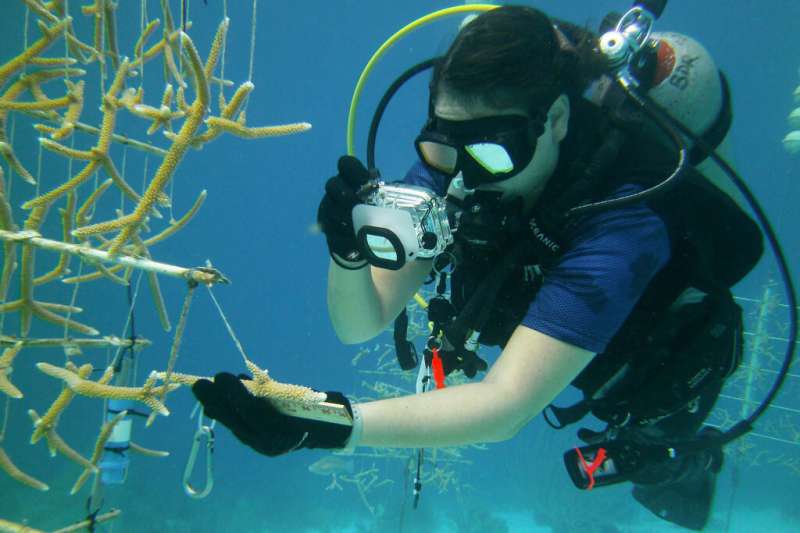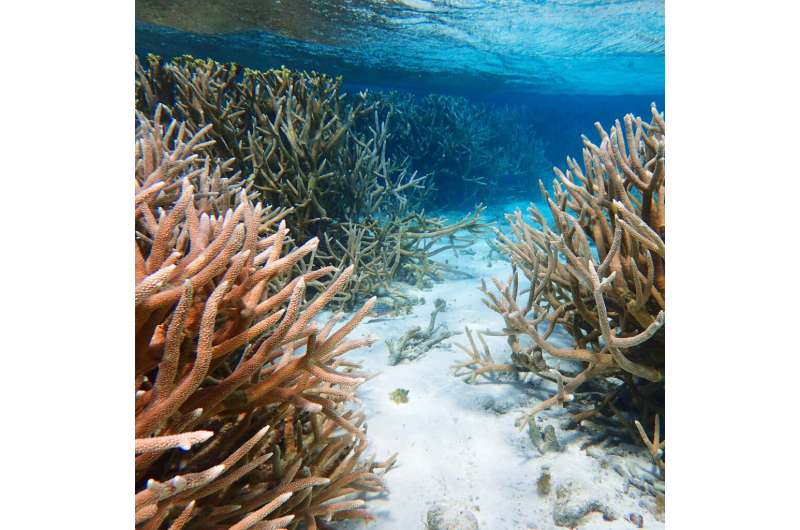Doctoral candidate helps guide research to support future coral conservation

Serena Hackerott is giving coral researchers a much-needed beacon of hope for the future of coral restoration and conservation.
The FIU Institute of Environment Ph.D. candidate in Jose Eirin-Lopez's Environmental Epigenetics Lab created a comprehensive collection of all the research to date on environmental memory and stress hardening in corals. The effort is designed to inform future work that could lead to successful coral restoration.
Coral stress memory is a relatively new, but very promising finding. It suggests corals can remember environmental changes—like marine heatwaves that cause coral bleaching—and that memory can build their resilience and help prepare them for similar events in the future.
However, there's one problem—exactly how this phenomenon works in corals is still unknown. As Hackerott points out, though, it's something scientists need to know before they try to implement stress hardening techniques on coral.
"Pre-exposing corals to stress, or stress-hardening, has the potential to enhance coral stress tolerance, which can help increase the long-term success of coral restoration and conservation outcomes," said Hackerott, who is also a research assistant with the NSF-funded CREST Center for Aquatic Chemistry and the Environment in FIU's Institute of Environment. "However, there are a lot of aspects about this process that we still need to understand before being able to effectively and efficiently implement these methods. We aimed to highlight these knowledge gaps and suggest future research directions needed to better understand coral environmental memory and evaluate the potential applications of coral stress hardening."

Coral stress hardening was introduced a few years ago as a possible strategy to save corals. It involves pre-exposing corals to stress, like higher temperatures, in a lab before returning them to the ocean. This is similar to the way stress hardening is used to make seeds hardier in agriculture.
Hackerott and Eirin-Lopez wanted to figure out how to make this work for corals. The first step was gathering and reviewing as many studies on environmental memory and stress hardening that they could.
The findings were interesting. In some cases, corals survive a heatwave and retain knowledge of the stress for a few years, and it helps them better resist the next heatwave. Then, there are examples where a heatwave is too much to handle, and instead of strengthening the coral, the stress becomes detrimental. The difference could be a matter of degrees. It's a delicate balance—too much heat, not enough heat or just right. Scientists need to do more studies to find the sweet spot.
The good news is technology could provide a closer look at what's happening to corals at the molecular level. Environmental epigenetics, for example—which is the focus of Eirin-Lopez's lab—is a promising starting point. In fact, epigenetic modifications are often involved in regulating stress memory within other organisms, like plants, and the Eirin-Lopez lab has been pioneering epigenetic research in corals.
"Corals are facing multiple stressors and we need to keep the urgency on reducing climate change and local sources of stress like nutrient pollution," Hackerott said. "But as coral stress hardening can possibly give us a cushion to help increase their survival, at least in the short-term, we need to better understand how and the extent to which stress pre-exposures can enhance coral resilience."
The work was funded by an NSF grant and published in Trends in Ecology and Evolution.
More information: Serena Hackerott et al, Coral environmental memory: causes, mechanisms, and consequences for future reefs, Trends in Ecology & Evolution (2021). DOI: 10.1016/j.tree.2021.06.014
Journal information: Trends in Ecology and Evolution , Trends in Ecology & Evolution
Provided by Florida International University





















